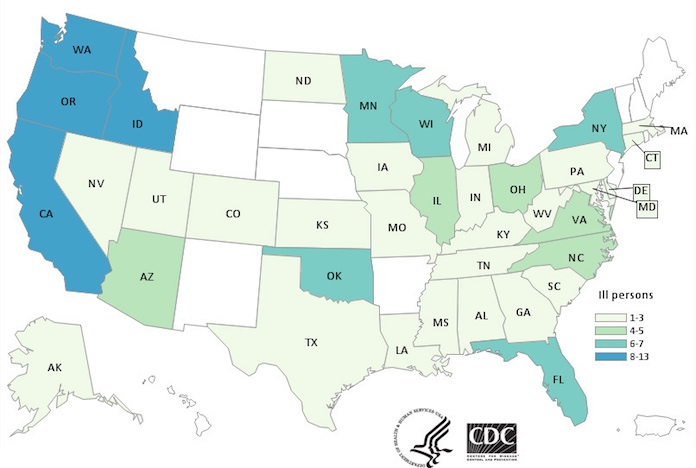The Salmonella outbreak linked to kratom products has grown to include 132 people sick, according to a new notice posted by the Centers for Disease Control and Prevention (CDC). Forty-five more ill persons from 19 states have been added to the outbreak total since the last update on March 15, 2018. Three more states have been added to the case count: Connecticut, Iowa, and Idaho.

The CDC and FDA recommend that no one consume any brand of kratom in any form because it could be contaminated with Salmonella. This compound is also known as Kakuam, Thang, Them, Biak, and Ketom. It is a plant that is taken as a opioid substitute and for its stimulant effects.
While no one specific kratom product has been tied to the outbreak, several companies have recalled their products made with kratom. You can see the full list of recalled products at the FDA web site. On April 3, 2018, the FDA issued a mandatory recall for all food products containing powdered kratom that were manufactured or packed by Triangle Pharmanaturals, the first time the FDA has used this regulatory power.
Epidemiologic and laboratory evidence indicates that kratom is the likely source of this outbreak. The outbreak consists of four strains: Javiana (15 sick), Okatie (21 sick), Salmonella Thompson (35 sick) and Salmonella I 4,[5],12:b:- (61 sick).
The outbreak case count by state is: Alaska (1), Alabama (1), Arizona (4), California (9), Colorado (3), Connecticut (1), Delaware (1), Florida (6), Georgia (3), Iowa (1), Idaho (8), Illinois (4), Indian (1), Kansas (2), Kentucky (3), Louisiana (2), Massachusetts (2), Maryland (1), Michigan (3), Minnesota (6), Missouri (2), Mississippi (1), North Carolina (5), North Dakota (1), Nevada (1), New York (7), Ohio (5), Oklahoma (6), Oregon (8), Pennsylvania (2), South Carolina (2), Tennessee (1), Texas (2), Utah (3), Virginia (5), Washington (13), Wisconsin (6), and West Virginia (1). Illness onset dates range from January 11, 2017, to March 20, 2018. The patient age range is from 1 to 72 years.
Thirty-eight of the 96 people who have been interviewed have been hospitalized, for a hospitalization rate of 40%, which is double the normal rate for a Salmonella outbreak. That could be because there is a lot of contamination in the products, or because the strains of Salmonella are quite virulent.
Of the 78 people interviewed, fifty-seven, or 73%, reported consuming kratom in pills, powder, or tea before they got sick. That is a statistically significant amount, which indicates that kratom products are the source of this outbreak.
The symptoms of a Salmonella infection include nausea, vomiting, fever, abdominal cramps, and diarrhea that may be bloody. People usually get sick 12 to 72 hours after they consume a product contaminated with this bacteria. If you have consumed kratom products and have been ill, see your doctor. The long term health consequences of this infection can be serious, including endocarditis, reactive arthritis, and irritable bowel syndrome.
Pritzker Hageman, America’s food safety law firm, successfully represents people harmed by adulterated food products in outbreaks throughout the United States. Its lawyers have won hundreds of millions of dollars for survivors of foodborne illness, including some of the largest verdicts and settlements in American history. The firm had a recent multi-million dollar victory on behalf of a child with a Salmonella infection who needed brain surgery. Pritzker Hageman lawyers are regularly interviewed by major news outlets including CNN, the New York Times, and the Wall Street Journal. The firm also represents people harmed by pathogenic microorganisms in Legionnaires’ disease, surgical site infection, and product liability cases.




